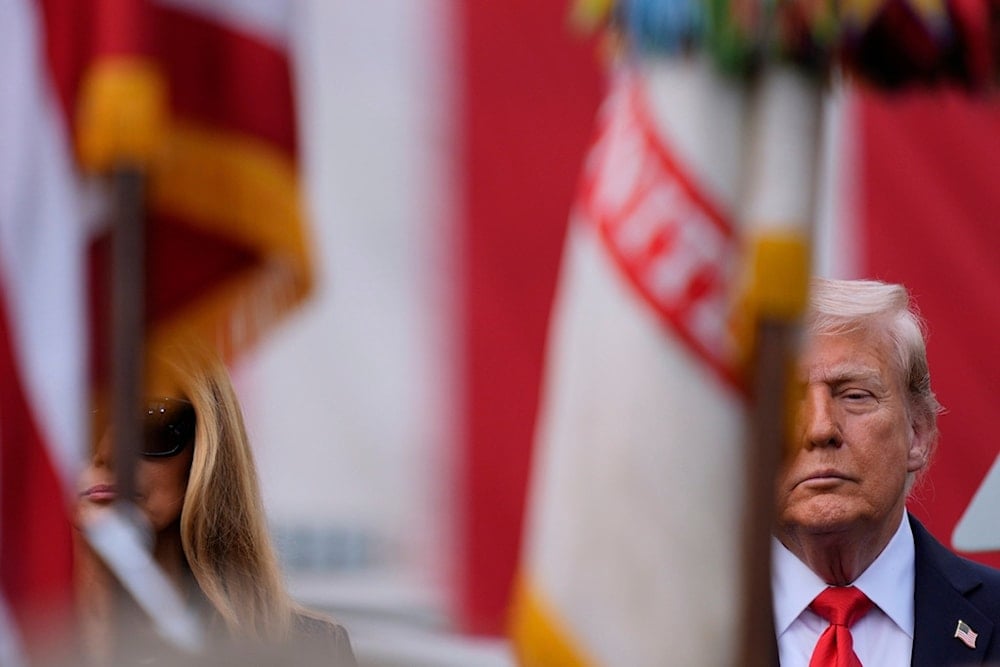Israeli strike, Russian drones test US global authority under Trump
An Israeli attack in Qatar and Russian drones over Poland challenge Trump’s claim that allies and foes respect US leadership.
-

US President Donald Trump and First Lady Melania Trump attend a ceremony at the Pentagon to commemorate the 24th anniversary of the 9/11 attacks, Thursday, September 11, 2025, in Washington. (AP)
An unexpected Israeli assault on Hamas leaders in Doha, paired with Russian drones violating Polish airspace, has cast doubt on President Donald Trump’s long-repeated assertion that allies and rivals alike hold the US in unprecedented regard, Bloomberg reported.
Trump voiced irritation with Israeli Prime Minister Benjamin Netanyahu for launching air raids on Qatar, an important American partner, yet stopped short of deeper involvement, according to Bloomberg. As for Russia, he declined to criticize Moscow after its drones entered NATO member Poland, remarking Thursday that it “could have been a mistake but regardless I’m not happy about anything having to do with that whole situation.”
That restrained approach contrasts with Trump’s own narrative about being uniquely capable of resolving global disputes. Though he has conceded that bringing Russia’s war in Ukraine to an end has proved tougher than he expected, he recently claimed that Vladimir Putin “wants to make a deal for me.”
Analysts urge a clearer US stance
“There is too much ambiguity in US policy,” said Elliott Abrams, a Council on Foreign Relations senior fellow and former Trump official, cited by Bloomberg. “We could not be more strongly against Hamas and its terrorism, but at the same time, we let the Qataris get away with supporting it.”
Abrams also pressed for firmer messaging toward Moscow, describing the incident that took place in Poland as “a war of aggression against a friend by an enemy.”
The Israeli attack, which the White House said was carried out without American approval, has put Trump in the middle of a dispute between close partners. He voiced regret and vowed such an event would not recur, even as Netanyahu insisted the operation was “a wholly independent Israeli operation,” Bloomberg noted.
Qatari Prime Minister Sheikh Mohammed Bin Abdulrahman Al Thani told CNN that the strike “killed any hope” of freeing the remaining Israeli captives taken by Hamas during October 7's Operation Al Aqsa Flood.
Despite Trump’s displeasure, administration officials described the episode as an “opportunity for peace,” echoing language from Netanyahu, according to Bloomberg.
Concerns about allied risk
Jon Alterman of the Center for Strategic and International Studies said "Israel" appeared to be acting on the premise that “there are no rules, just capabilities,” warning that its aim of wiping out Hamas was viewed by allies as unattainable, Bloomberg wrote.
Moreover, American officials reportedly alerted Doha once they learned the attack was underway, which Bloomberg said explained the lack of advance notice from Tel Aviv.
Russia capitalized on the crisis to fault US diplomacy. At the UN Security Council, Moscow’s ambassador Vasily Nebenzya argued that Washington’s reliance on “quiet diplomacy” was feeding instability.
Trump, meanwhile, has maintained direct lines to Putin despite the apparent Western isolation of the Russian President following the start of the Ukraine war. After hosting his Russian counterpart in Alaska, Trump suggested a truce was close, though no signs of that are anywhere to be seen.
Arab allies questioning US guarantees
Similarly, CNN's Paula Hancocks wrote in an analysis piece on Thursday that the Israeli attack on Qatar left it, and the surrounding Arab nations, betrayed and abandoned by its close allies in Washington.
She states that the strike on a residential building targeting the Hamas delegation hours before they were expected to deliver a response to a new US-led ceasefire and captive deal crumbled the progress made over the past 23 months of war.
Hancocks states that the Israeli attack shocked Qatari officials, who had believed their strong ties with Washington and the presence of the massive Al Udeid US airbase in the country would shield them from such a strike.
The CNN writer says that the attack on Doha raised serious questions across the Gulf regarding the reliability of US security commitments. She highlights that despite being home to the largest American military base in the region, Qatar was unable to avoid an Israeli strike.
“Those nations will be wondering what they can do in order to deter future attacks, but also, what sort of security architecture they need to now invest in instead of relying on a partner that hasn’t been able to protect them even from one of its own allies,” said HA Hellyer of the Carnegie Endowment for International Peace.

 4 Min Read
4 Min Read








